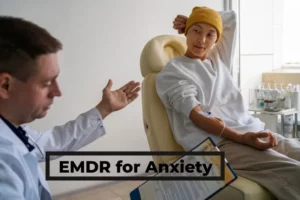Introduction
Social Anxiety disorder or social phobia is characterized as avoidance or extreme fear of social situations. If left untreated, social anxiety disorder can have serious repercussions. Since it is such a huge problem, one of the solutions for it is Cognitive behavior therapy (CBT). CBT is considered the best approach and has shown remarkable success in tackling the issue.
CBT for Social Anxiety
CBT specifically tries to provide tools that help in identifying negative thoughts. It might be related to one’s self-worth and ability that trigger anxiety in certain social situations. Some techniques, like cognitive restructuring, are used to challenge irrational, unrealistic beliefs and thought patterns.
To build tolerance for anxiety-inducing social situations, we use hierarchical exposure therapy to get out of one’s comfort zone. The best thing about CBT is that it teaches people to become their own therapists. And teaches the long-lasting skills that can be used as coping mechanisms.
CBT is not like your traditional therapy, it is a tad bit different as it is more of a skill-focused, active, and brief treatment method. Also, it requires the individual to practice cognitive and behavioral skills by constantly doing homework assignments. Most research evidence supports that compared to medications or other forms of therapy, CBT is one of the most effective methods.
CBT Exercises for Social Anxiety
The treatment in CBT involves confronting feared social situations or scenarios in a systematic manner. We start this with the least anxiety-provoking situation first. So, the exposure is done repeatedly until the social situation gives less anxiety. And then, the individual moves on to the next fear in the hierarchy of fears.
Behavioral experiments are used to test beliefs in real-life social interactions using objective evidence gathering. To reduce the symptoms of anxiety, techniques like Deep Breathing and Progressive muscle relaxation can be really helpful.
Other techniques for treating social anxiety include CBT exercises. Like Role plays to recreate certain social situations and guided imagery to set certain goals in mind. CBT can also be effective online with the help of interactive online CBT modules. To increase the success rate in CBT, the patient should be actively willing to take action and perform the exercises.
Why Does CBT Work for Social Anxiety
In order to reduce Social Anxiety through CBT, there is a certain procedure that goes on behind it. It includes a better understanding of anxiety and certain tools for management. CBT helps you change thinking patterns, which habitually make you feel negative and avoidant. It makes you consciously aware of the fact that anxiety is pretty normal and can be easily managed.
Importantly, exposure therapy gives you advantages in changing your perception of certain social situations and makes them less frightening. In addition to this, it helps you think more neutrally in terms of failures or rejections that you might face.
As we talked about above, CBT plays a major role in helping the patient become their own Therapist. CBT uses transferable life skills, which help the patient in creating long-lasting coping mechanisms for their social anxiety. So, CBT can help you deal with your social anxiety better due to its effective mechanisms.
How Does CBT Work for Social Anxiety
As discussed, CBT is a potent and proven method to manage social anxiety. While its base is made up of a psychological basis, the treatment is practiced rationally. It is capable of conducting logical examinations. With the help of that, we can challenge the cognitive disruptions as well as identify them in the first place.
It makes social situations less overwhelming through problem-solving skills, which eventually helps you look at critical situations more rationally. CBT allows you to go through a process of attention training, which makes you more conscious of being able to differentiate between imagined judgments and reality.
It helps you to become more adaptable to deal with social failures or other unexpected social situations. CBT exposes you to better opportunities for building your confidence and decreasing insecurities regarding social situations to an extent.
Useful Techniques of CBT for Social Anxiety
Following are the techniques that are employed by CBT to provide the highly effective results it does.

- Cognitive restructuring – This technique basically helps us to ease our anxiety by challenging unrealistic thoughts.
- Exposure hierarchy – It helps you by making you start practicing with smaller fears in your hierarchy of social fears. And making you work your way up to the bigger ones.
- Assertiveness skills – This technique gives you the advantage of being more confident. By making you sure and comfortable when you show who you are.
- One CBT technique makes you first set up SMART goals, which is an abbreviation for Specific, Measurable, Achievable, Relevant, and Time-bound. Secondly, use experiments to test your plans and beliefs.
- You can also use Mindfulness or Meditation in order to ground yourself.
- Finally, CBT also teaches you to deal with negative thoughts and situations. Also, being more logical after certain things happen.
Conclusion
To sum it all up, we have learned that Cognitive Behaviour Therapy (CBT) basically uses cognitive, behavioral, and coping strategies. These are personalized from individual to individual. CBT provides the patient with knowledge, skills, and tools to deal with anxiety in social situations. It also helps the patient in creating long-lasting coping mechanisms for anxiety-inducing social situations using these skills and knowledge.
CBT uses multiple techniques in order to help the patient cure their social anxiety. Some of those techniques are cognitive restructuring, systematic desensitization, social skills training, and assertiveness skills. CBT helps the patient in improving their anxiety long term.
It does this by helping change the patient’s thought patterns. CBT teaches patients to take a more logical approach to negative thoughts and anxiety-inducing social situations. And this is how CBT is able to produce long-lasting and effective results. Find more useful resources on United We Care!
References
- American Psychiatric Association. (2013). *Diagnostic and statistical manual of mental disorders* (5th ed.). Washington, DC: Author.
- Moorey, S., & Lavender, A. (2019). *The therapeutic relationship in cognitive behavioural therapy*. Sage. [Online]. https://doi.org/10.4135/9781526461568
- Tams L. (2013). *ABC’s of changing your thoughts and feelings in order to change your behavior*. Retrieved from: canr.msu.edu/news/abcs_of_changing_your_thoughts_and_feelings_in_order_to_change_your_behavio
- SAMHSA Native Connections. “Setting Goals and Developing Specific, Measurable, Achievable, Relevant, and Time-bound Objectives” (PDF). Substance Abuse and Mental Health Services Administration.
- Courtney E. Ackerman. (2020). “CBT’s Cognitive Restructuring (CR) For Tackling Cognitive Distortions.” Retrieved from: https://positivepsychology.com/cbt-cognitive-restructuring-cognitive-distortions/
- American Psychological Association. (2017). “What is Exposure Therapy.” Retrieved from: https://www.apa.org/ptsd-guideline/patients-and-families/exposure-therapy
- Dobson, K. S., & Dozois, D. J. A. (2019). *Handbook of cognitive-behavioral therapies* (Fourth ed.). Guilford Press.










